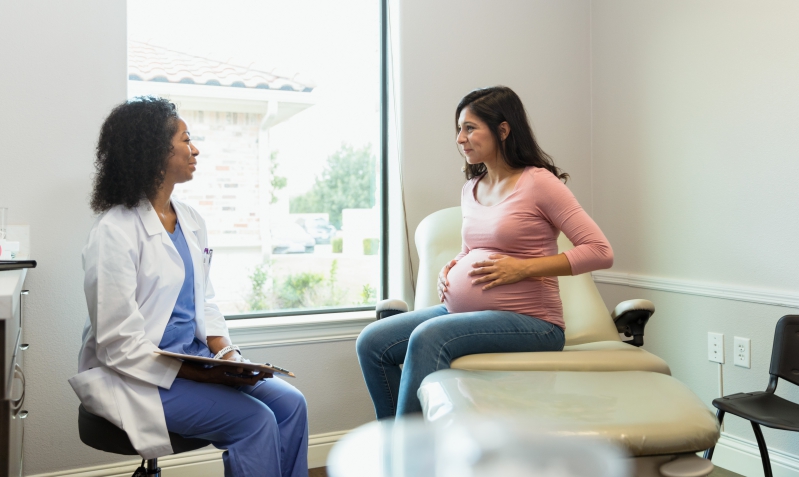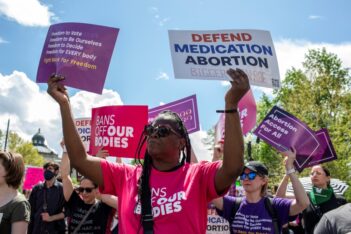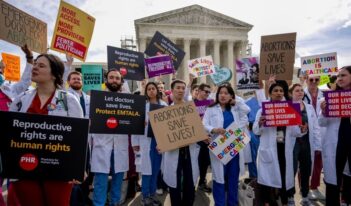
As the Supreme Court evaluates abortion laws, states should bolster reproductive rights and better regulate CPCs.
The U.S. Supreme Court’s decision to review whether Mississippi’s pre-viability abortion ban is still unconstitutional, and the Court’s failure to enjoin Texas’s near-total abortion ban, have thrown a spotlight on the precarious state of abortion rights in the United States. These cases come after decades of abortion restrictions—mostly at the state level—that have already made abortion inaccessible for many people, especially Black and brown people, individuals living in poverty, and people in rural areas.
For example, the federal Hyde Amendment prohibits the use of federal funding for abortion care, and Pennsylvania law prohibits the use of state funding. The resulting denial of abortion coverage for people in Pennsylvania’s Medicaid program disproportionately harms Black and brown people who face structural inequities that make them more likely to live in poverty than white people.
Meanwhile, Pennsylvania also diverts funding from the Temporary Assistance for Needy Families (TANF) program to anti-abortion, anti-contraception, and anti-LGBTQ+ organizations known as crisis pregnancy centers (CPCs). Furthermore, it is one of a minority of states that not only diverts TANF funding to CPCs, it also directly funds them through a state contract.
There is little government oversight of CPCs. In 2017, at the conclusion of a rare audit, the Pennsylvania Auditor General found that Real Alternatives, the umbrella organization for the state-funded CPCs, inappropriately used Pennsylvania’s money to promote itself in other states. Nevertheless, the Commonwealth renewed Real Alternatives’ contract to provide “alternatives to abortion” services. In addition to lingering ethical concerns about the way state-funded CPCs operate, there are also questions about the scope and quality of the services that CPCs provide, whether state-funded or not.
To shed light on these services, the Alliance, a coalition of state advocates for women’s rights and gender equality, including the Women’s Law Project, and the California Women’s Law Center, reviewed CPC websites and analyzed the services they offer. In its recently released report, the Alliance found that the four most common services CPCs offer are: (1) pregnancy tests—often the same as the self-administered tests available at local drugstores; (2) free material goods such as diapers and other infant supplies—or opportunities for individuals to earn these goods by completing CPC programming; (3) peer-to-peer, anti-abortion “counseling;” and (4) non-diagnostic ultrasounds.
In Pennsylvania, CPCs outnumber abortion clinics by a ratio of nine to one. Pennsylvania CPCs offer the same services as CPCs in the other states, except that the most common service provided is free or earned goods, followed by pregnancy testing. Pennsylvania is one of two states in the study that funds CPCs directly, which has enabled researchers to uncover disturbing differences between state-funded and non-state-funded CPCs.
The researchers found that fewer state-funded CPCs refer clients for prenatal care than non-state funded CPCs. And more state-funded CPCs promote an unscientific practice known as “abortion pill reversal,” which involves the administration of progesterone to individuals who have taken the first, but not the second, of the two-pill medication abortion regimen.
CPCs regularly claim that abortion pill reversal is able to stop a medication abortion, but there is no evidence to support this practice. Indeed, the American College of Obstetricians and Gynecologists has deemed it “unethical” and “unproven.” Abortion pill reversal promotion is among many examples of misleading and medically inaccurate information that the Alliance’s study found on CPC websites.
Another finding in the Alliance’s report is that, although many CPCs portray themselves as medical facilities, they provide virtually no medical services. In addition to the fact that almost none of these centers provide or refer for prenatal care, almost none provide or refer for contraception or, of course, abortion. These failures raise questions about the U.S. Department of Health and Human Services’ decision to permit the diversion of TANF funding to CPCs and the Pennsylvania Department of Human Services’ inclusion of funding for programs that “promote childbirth instead of abortion” in the TANF state plan.
Even though diverting TANF funding to CPCs may be consistent with the paternalism and racism underlying the TANF program, which is tied to a long history of controlling Black women’s bodies, it is inconsistent with the stated goal in the statute of preventing and reducing “the incidence of out-of-wedlock pregnancies.”
The siphoning of funding for pregnant people and children living in poverty is emblematic of the broken safety net that CPCs exploit to prey on vulnerable people. Instead of addressing the factors that lead people to CPCs, including economic insecurity and inadequate access to comprehensive reproductive health care, states such as Pennsylvania fund fake clinics that promote misleading and harmful information, delay access to genuine health care, and collect information from clients who have no privacy protections available to them—because CPCs typically do not qualify as health care providers and therefore do not need to comply with the Health Insurance Portability and Accountability Act (HIPAA).
CPCs have been notoriously difficult to regulate, as the U.S. Supreme Court’s case of National Institute of Family and Life Advocates v. Becerra shows. In this case, the Court held that a California law that required licensed clinics that primarily serve pregnant people to notify them that the state provides free or low-cost services, including abortions, and required unlicensed clinics to disclose that they are unlicensed likely violated the First Amendment.
The Alliance report, however, includes a number of state-based policy recommendations to regulate CPCs that can avoid the First Amendment questions raised in Becerra. For example, the report recommends the passage of laws that would extend HIPAA-like protections to people served by entities providing pregnancy-related services. It also recommends addressing the maternal and reproductive healthcare gaps that CPCs exploit. It is important for states to shore up reproductive rights so that CPCs are not more accessible than genuine reproductive health care—especially now that the Court is poised to overrule or gut Roe v. Wade and Planned Parenthood v. Casey.
It is also important for states to implement antiracist measures to alleviate poverty and dismantle systemic oppression so that people do not undergo biased counseling at a CPC simply because they cannot afford a pregnancy test or infant supplies. Public funding should support evidence-based programs, not CPCs that regularly promote unproven and potentially dangerous treatments to low-income pregnant people.
The Alliance report is a call to action, highlighting the need to hold CPCs accountable amid the political landscape that has fueled and funded the CPC industry’s growth while decreasing access to comprehensive, evidence-based reproductive health care.
Although there is a role for the federal government to play in the fight against CPCs, the battle is primarily in the states, which have the ability to bring back and improve reproductive rights and health care access regardless of the future for Roe and Casey in the federal courts.




